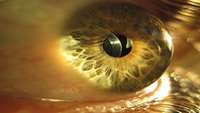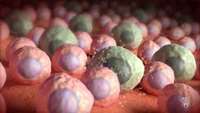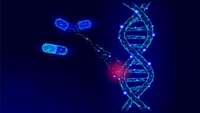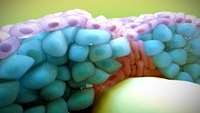Tiny devices based on microfluidics set to revolutionize detection and treatment of cancer
A new generation of pathology labs mounted on chips is set to revolutionize the detection and treatment of cancer by using devices as thin as a human hair to analyze bodily fluids.
Allergan and Editas Begin Recruiting for CRISPR/Cas9 Clinical Trial for LCA10
Allergan, a global pharmaceutical company, and Editas Medicine, a developer of gene-editing therapies, have begun patient recruitment for a Phase 1/2 clinical trial for a CRISPR/Cas9 treatment for people with Leber congenital amaurosis 10 (LCA10). The treatment targets a specific mutation (c.2991+1655A>G in Intron 26) of the gene CEP290.
New cause of cell aging discovered
The work, from Assistant Professor of Chemical Engineering and Materials Science Nick Graham and his team in collaboration with Scott Fraser, Provost Professor of Biological Sciences and Biomedical Engineering, and Pin Wang, Zohrab A. Kaprielian Fellow in Engineering, was recently published in the Journal of Biological Chemistry.
Delivery system can make RNA vaccines more powerful
Vaccines made from RNA hold great potential as a way to treat cancer or prevent a variety of infectious diseases. Many biotech companies are now working on such vaccines, and a few have gone into clinical trials.
New protein found in strongest spider web material
A team of researchers affiliated with several institutions in the U.S. and Slovenia has found a previously unknown protein in the strongest known spider web material. In their paper published in the journal Communications Biology, the group describes their study of Darwins bark spider silk and the glands that produce it.
Welcome to our spotlight on gene therapy!
Gene therapy has the potential to eliminate a number of diseases which are currently causing distress to patients and burden on the healthcare system. Gene therapies have been tested in vitro and were deployed in the clinic for the first time in 2017. The promise of a ‘cure’ has proved tempting for investors and developers alike.
Iran’s Top Science Official Vice President Sorena Sattari
Dr. Sorena Sattari is the Vice President of Science and Technology of the Islamic Republic of Iran. He was born in 1972 to a military family, and he has three younger sisters.
Neighboring Countries Will Have Access to Iranian Laboratory Services
Manager of strategic technologies laboratory network introduced the neighboring countries of Iran as the new customers of Iranian laboratory services, stating: providing domestic laboratory services to neighboring countries of Iran will be facilitated.
Iranian Knowledge-based Companies Will Attend China Hi-Tech Fair (CHTF)
The advisor to the vice president for science and technology affairs announced sending a commercial delegation encompassing creative and technological knowledge-based companies of Iran to China, stating: visiting and attending the CHTF is one of the highlights of the trip.
Mechanical forces control cell fate during brain formation
A new study coordinated by the Research Group in Developmental Biology at UPF shows that during the embryonic development of the brain, the cells that are between adjacent segments detect the mechanical forces generated during morphogenesis to regulate the balance between progenitor stem cells and differentiated neurons.












